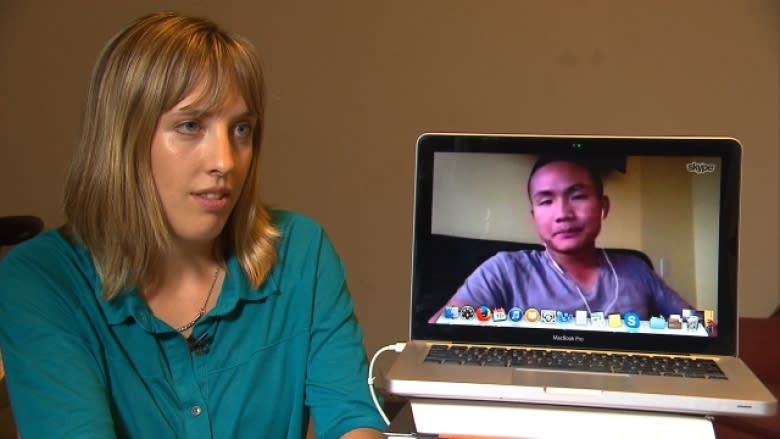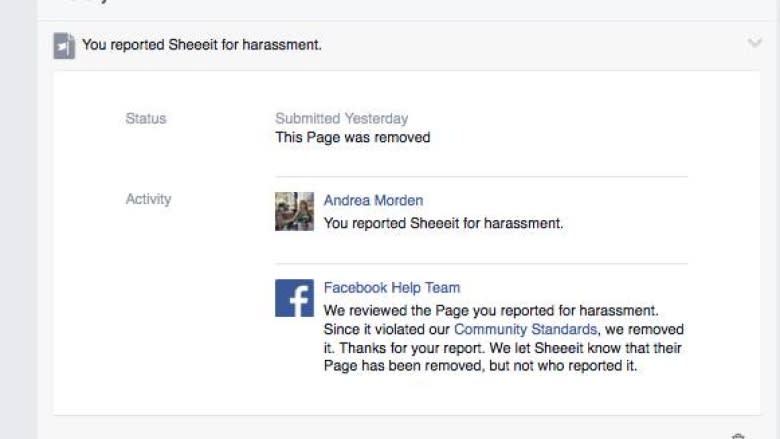Facebook user page accused of racism removed after CBC inquiry
A Facebook user page full of cartoon strips mocking black people and other minorities has been removed after repeated complaints from two Montrealers, and inquiries by CBC Montreal Investigates.
Ken Wang and Andrea Morden contacted CBC after receiving Facebook's initial responses to their complaints about the page, called Sheeeit.
The social media giant first said the content of the page did not violate its community standards.
Wang, an infantryman with the Canadian Armed Forces, said he noticed the page after an acquaintance of his linked to an image in his news feed.
"I opened it and I found it rather questionable. The content itself was, in my opinion, pretty racist, but then again it could just be a cartoon that I was being overly sensitive about," Wang said, adding he originally was not sure if he should raise a fuss.
Then he looked at the rest of the posts on Sheeeit.
One set of drawings showed a black man shoplifting a watermelon and getting beaten up by a police officer.
Another depicted a black man stealing a wallet from an unconscious person after a car accident.
"I found a pattern of blatantly mocking people of all kinds of ethnicities, except caucasian males," Wang told CBC News.
"I read the comments, and I found the pattern of white supremacists commenting, glorifying essentially what the whole page was portraying, and mocking basically all the victims in this whole post."
No Facebook action on original complaints
Wang reported the page to Facebook and received a response saying the company reviewed it and did not find that it violated community standards.
Wang's girlfriend, McGill University student Andrea Morden, also reported a photo on the page, and was sent the same notification from Facebook.
"This content, it's not like Chris Rock's standup, commenting on race relations in America," Morden said. "This is white supremacist ideology being perpetuated through cartoons."
Facebook declined interview requests from CBC Montreal Investigates but in an email, spokesman Alexandre Lainesse said it has a "complete team dedicated to this type of demand."
The company removed Sheeeit after being contacted by CBC, though a similar page which appears not to have been updated since October 2013 is still online.
Standards questioned
Facebook did send CBC a link to its community standards, which state that it "does not permit hate speech, but distinguishes between serious and humorous speech."
"While we encourage you to challenge ideas, institutions, events, and practices, we do not permit individuals or groups to attack others based on their race, ethnicity, national origin, religion, sex, gender, sexual orientation, disability or medical condition," the text reads.
Facebook also pointed to its policy regarding humour that could be deemed controversial. That policy states that authors of such pages are required to identify themselves and may find the pages removed if they refuse.
It said the cartoons in question would not have been considered hate speech.
For some specialists, there is no doubt Sheeeit should not have been allowed on the web.
Charmaine Nelson is a member of Montreal's black community as well as a professor of Art History at McGill University.
"These are pretty blatantly racist stereotypes of black people," she said of the pictures on Sheeeit.
"This is supposed to be what? A black man holding up a convenience store?" she asked, looking at one cartoon.
"Stereotypes of criminality are very dangerous for black men," she said. "We have the case right now in Ferguson. We had Trayvon Martin, who was unarmed, being pursued by the security guard."
Previous cases
This is not the first time Facebook has faced criticism for not acting on complaints about racist views being promoted on its user pages.
In Australia two years ago, a page based on Aboriginal memes made headlines, and thousands of people signed an online petition asking for it to be taken down.
Even the Australian government weighed in before Facebook finally pulled the page.
"People made those memes," Meriki Onus, an Aboriginal from the Gunnai Nation in Australia, told CBC.
"A person got up and went out of their way to create those memes and they felt comfortable in the society that they grew up in, with the education that they received, to make those statements about Aboriginal people," she added
She said the real problem is the existence of such racism and prejudice, and Facebook is only a platform.
The authors behind the Sheeeit page did not respond to a message from CBC News.
CBC Montreal Investigates
Do you have a story you think CBC Montreal's investigative team should look into?
Leave a message on our confidential tipline, send us an email or contact us on Twitter.
Tipline: 514-597-5155
Email: montrealinvestigates@cbc.ca
Twitter: @CBCMontreal





